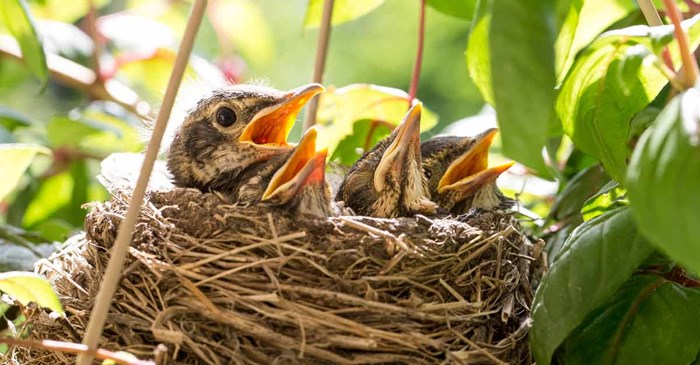A pair of birds weave twigs and grasses into a wee nest in the crook of the backyard tree. And so begins a beautiful spring story. You just want it to end happily, with a brood of healthy birds.
So when you spy a baby robin wobbling about on the lawn, panic sets in and you want to help. What should you do?
Does that baby bird really need your help?
When you find a baby bird out of the nest, the first thing you need to do is figure out whether the straying birdlet really needs a helping hand. Odds are, if the young bird is out and about, he’s ready to leave the nest. At the same time, he hasn't reached full maturity, which is why you’ll see the little bird’s parents close by, still feeding and caring for their young.
Signs that the bird doesn't need help:
- It’s covered with feathers. Its plumage may be spotted and mottled to help them camouflage with their surroundings.
- It has the ability to move on its own. His efforts may be clumsy and labored, and, unlike his parents, he may be unable to fly to safety yet. But if he’s scooting around, he probably left the nest on his own.
- The parents are nearby. Over the coming weeks, mom and dad will be in his life, feeding him and his siblings.
So back away, and keep pets out of the area as well.
The exception to the rule: if you notice that the juvenile bird is injured, it will need outside help. Contact your local wildlife or rehabilitation center, or a veterinarian to get started. Do not attempt to heal it on your own.
Finding hatchlings and how to respond
On the other hand, hatchlings — helpless, newly hatched babies — sometimes fall or get knocked out of their nests. Hatchlings are smaller and weaker than juvenile birds, either bald or covered with fuzzy down feathers, helpless and possibly blind.
If you find a hatchling on the ground, look up to see if you can locate the nest. Put on a pair of gloves and carefully place the hatchling back inside. Then, from a safe distance (preferably indoors) watch for the return of the parents. If an hour or more passes without any sign of the parents, contact your local wildlife rehabilitation center or a veterinarian.
Otherwise, never attempt to raise the babies yourself. Not only would you possibly be breaking the law, but baby birds need proper care and nurturing to survive in the wild, so it should be taken on only by someone with the appropriate education and training.
When spring has sprung, keep your feeders filled with Lyric Fine Tunes No Waste Mix, and you’ll give nesting birds a much-needed source of high-quality protein during a demanding time — without making a mess on your deck or yard. Later, you may experience the delight of seeing young bird families come in for a feeding!
